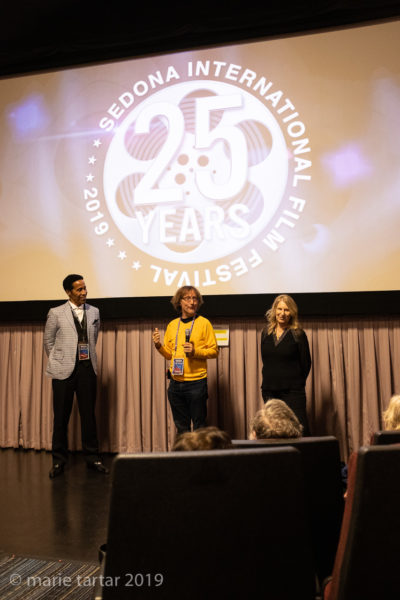
Overheard at the start of this year’s Sedona International Film Festival, directed to festival director Patrick Schweiss:
“Is this a good film? ‘Cause I just paid $100 to get out of my garage!” We could relate: we drove in late the night before to find our street unplowed, with just one set of car tracks down the middle keeping us from sticking. We made it almost to the house, finally grinding to a halt in snow, tires spinning, feet from the driveway.
We had to leave the car in the street overnight. The shovel we had at the house wasn’t intended for snow. Somehow, Steve managed to maneuver the car closer to the edge of the road, leaving a shoveled path wide enough for a car to pass, despite the 2 am hour.
The annual Sedona International Film Festival (SIFF) has become a fixture on our calendar, each year at the end of February. This was a special year, the 25th SIFF, and our 8th in a row. The festival has evolved and matured over the years and we remain amazed at the quality of the films shown, the variety and breadth of offerings and the excellent organization. We first happened on the festival back in 2010. We happened to be in Sedona that week and managed to catch a few films. This required a lot of standing in lines, more than I cared to repeat, although we did meet a lot of interesting attendees in those lines. It took another 2 years to synch our schedule with SIFF’s, but since 2012, we’ve graduated to full participation as Gold Pass holders, snatching meals and hikes in between showings.
Each year the festival seems to grow in scope, with a more and more robust and full roster of films stretching from one weekend to the next, with 5 screenings a day for years. Two years ago, we were thrilled when the festival throttled back to a more manageable pace of 4 screening times a day, at 10 am, 1 pm, 4 pm and 7 pm (previously, it was breakneck, with screenings at 9 am, 12 noon, 3 pm, 6 pm and 9 pm).
We’ve become friends over the years with other regular attendees, including James and Jeannette up from Phoenix, local red-headed realtor Rebekah and Gary and Laura, who share our love of mid-century design. James and Jeannette, who always maximize the Gold Pass’ potential by attending every single screening, may be the only attendees who mourn the former 5 films/day schedule.
This year, one subtle change was evident: all other festivals ended the weekend of the Academy Awards. This is the first I recall beginning the weekend of the awards. As usual, we were way behind on actually seeing most of the nominees. Of the 8 nominees for best picture, we had seen only Roma and BlacKKKlansman. As a percentage, we had seen more of the nominees for Best Foreign Language Film (2 out of 5, Shoplifters and Roma) and we managed a 3rd, Cold War, at SIFF.
Actually getting to Sedona for the festival was more of an adventure than usual. We were both very ready for a break, having worked non-stop since our return from Antarctica in late January.
Intense rains in San Diego manifested as record-breaking snowfall in Sedona, culminating just before our arrival late on a Friday evening, after working, flying to Phoenix and driving up. We’ve experienced many snowfalls in Sedona, but none that ever persisted in any meaningful way on the roadways. Until now.
Saturday, February 23, 2019
In the morning, I was highly motivated to make the first movie, at 10 am at the high school, If Beale Street Could Talk, adapted by Moonlight director Barry Jenkins from the 1974 James Baldwin novel. Waking up to a gorgeous snow-wreathed Sedona, we took stock: how to get to the theater? The car was stuck until the snow melted, and wouldn’t be freed before afternoon. We considered walking towards town and summoning an Uber, but we were tight on time. Christina, headed into town for a massage, came to our rescue in her Rubicon.
The film is set in Harlem in 1974 and is the story of young lovers, Tish (Kiki Layne) and Fonny (Stephan James) whose marriage plans are interrupted when Fonny is framed for a rape he didn’t commit. A warm color palette is used to evoke the warmth of Tish’s supportive family, a stark contrast with the systemic injustices in the lives of African-Americans, then and now. The evening of the alleged rape, Tish and Fonny are at home, entertaining an old friend, also African American, who has just been released from jail, having had to accept a plea deal, effectively admitting to stealing a car when what he was guilty of was having some pot. Regina King’s performance as Tish’s loving mother was rewarded with an Academy Award, and Jenkin’s adapted screenplay with a nomination.
We caught the shuttle back to town just long enough to grab paninis from Pisa Lisa, only to immediately return for the 1 pm showing of another Academy Award nominee from Poland, Cold War. This is a beautifully shot black and white film, following the circuitous and tumultuous love story of Wiktor (Tomasz Kot) and Zula (Joanna Kulig), a couple based on the director Pawel Pawlikowski’s own parents. He is a conductor and musicologist and she is a singer he meets while auditioning singers for a chorale group in post-WW II Poland.
This film garnered a nomination for Best Director for Pawlikowski, as well as a Best Foreign Film nomination. I had admired his earlier film Ida, in which, just before taking her vows to become a nun, a young woman meets her aunt for the first time and learns that her parents were Jews killed in WW II.
Sunday, February 24, 2019
The snow was still gracing the red rocks, so I flew the Mavic Pro 2 before we headed out for the first of two French films. Both were terrific, beginning with 2017’s Promise at Dawn (Le Promesse de l’Aube), based on French writer Romain Gary’s autobiography, directed by Eric Barbier. It stars Charlotte Gainsbourg as an ambitious and domineering single mother of Romain (played by Pierre Niney as the adult Romain), who is determined that her son will be a great man who will have “his suits made in London”. Pierre Niney’s performance in 2016’s Frantz as a mysterious Frenchman who befriends the grieving parents and fiancée of a dead German soldier was a highlight for me of the film festival 2 years ago.
Our second French feature was equally absorbing: School of Life (L’ecole buisonnière). This enchanting film, directed by Nicolas Vanier, features two of my favorite French actors, Éric Elmosnino (who I loved in the biopic of French singer Serge Gainsbourg entitled Gainsbourg: vie héroïque) and Francois Cluzet (Intouchables, Tell No One). Elmosnino plays Borel, a game warden on a large forested estate in the Loire Valley, who is fixated on shutting down poacher Totoche, who lives on a houseboat on a nearby river and lives off fishing, hunting and foraging in the forest. Borel’s wife works as a maid in the chateau of the Count de la Fresnaye and brings into her household an orphaned boy from her hometown. Adorable young Jean Scandel plays the orphaned Paul, who quickly learns the ways of the forest from Totoche. The film makes beautiful use of wildlife scenes in the forest and has a luxurious pacing toward a very satisfying ending. Vanier’s 2013 film, Belle and Sebastian, which we enjoyed at the film festival in 2015, also made similarly skillful use of animal characters.
Chatting with festival director Patrick in the lobby afterwards persuaded me to stick around for one more film, while Steve headed home. The Tobacconist features Bruno Ganz as Sigmund Freud in Vienna as the Nazis tighten their grip on Austria. Freud is a regular patron of a tobacconist (Johannes Krisch). Simon Morzé is a young man, Franz, newly arrived from the country who is apprenticing with the tobacconist. Franz and Freud develop an unlikely friendship as the tobacconist is targeted for being Jew-friendly.
Monday, February 25, 2019
We took the morning off, lazing at home with avocado toast, even did some CME. For lunch, we tried out a restaurant new to us, the Hudson at Hillside, formerly Shugrues. That led to the happy discovery of a good shoe store in the shopping center for my expanding and aging feet, A Step Up.
Our afternoon and evening slate of two films started with No Date, No Signature, a taut 2017 Iranian medical and legal thriller directed by Vahid Jalilvand. A forensic pathologist has a collision with a family on a motorcycle. He examines the 8 year-old boy and recommends the family be evaluated at a nearby clinic, advice the family disregards. The next morning, the boy is brought in dead. Was it the accident or an alternate diagnosis reached by his colleague? He becomes obsessed with the family. This film had us standing in the hall afterwards with Jim and Jeanette and other attendees discussing it. We thought the medical premise a bit shaky but the film-making had us engrossed.
Our evening feature was similarly engaging, Tell It to the Bees, set in a small provincial Scottish village in 1952. Based on the Fiona Shaw novel, the film is directed by Annabel Jankel. Anna Paquin plays a young doctor who has returned to her childhood home to take over her late father’s practice. A young boy, Charlie (an adorable Gregor Selkirk) meets the doctor in her office after a schoolyard scuffle . He is invited to “tell his secrets to the bees”, as she did as a child. His mother (English rose of an actress Holliday Grainger) is struggling financially and emotionally after her husband leaves her. When Charlie’s mother is sacked from her job at the mill and they are evicted, the doctor throws them a lifeline, engaging Charlie’s mum as a housekeeper and giving them a place to live. Their relationship gives rise to gossip in the small town.
Tuesday, February 26, 2019
Another day of wonderfully interesting films. Steve and I took the morning off, seeing Dogman before being joined by Cindy and Gerry up from Phoenix for two comedies at the high school, To Dust and Ode to Joy.
Dogman was an astoundingly riveting 2018 Italian film, directed, co-written and co-produced by Matteo Garrone. It was Italy’s submission for consideration for Best Foreign Film at the Academy Awards. Marcello Fonte plays Marcello, a slight, mild-mannered dog groomer and affectionate father who, along with virtually everyone in his seaside Italian village, is terrorized by a local tyrant, Simone (a menacing Edouardo Pesce). He is coerced into aiding and abetting Simone’s criminal ventures. He was a fascinating character, utterly unforgettable. I found myself thinking during the film back to the protagonist of No Date, No Signature, who also has a misdirected sense of duty.
Dogman was draining and intense, making us very ready to follow-up with two comedies, a relatively rare species at the festival. After a quick bite at Tamaliza, we headed off to SPAC for To Dust, a very dark comedic drama and exploration of grief and bodily decomposition. Orthodox Jew Shmuel (Géza Röhrig) is virtually immobilized by his wife’s recent death from cancer. He embarks on a quest to educate himself as to what happens as a body decomposes, enlisting the aid of an unwilling community college science teacher Albert, wonderfully played by Matthew Broderick.
More laugh out loud funny was the romantic comedy which followed, Ode to Joy, starring Martin Freeman (who we loved as Sherlock’s sidekick Watson) as Charlie, a young man with an episodically paralyzing condition, cataplexy. His tendency to collapse whenever he feels strong emotion, especially joy, seriously impedes his love life. He meets Francesca (Morena Baccarin), a beautiful and noisily expressive girl with a tendency to go for losers, in the library where he works, when her boyfriend chooses that as the place to break up with her.

Cindy and Gerry were not our only visitors during this stay; a family of javelinas roots around the yard.
Wednesday, February 27, 2019
After a lazy morning at home, we made it out for one movie each. Steve and I went to the early afternoon showing of Ghost Light, a very fun film spoofing theatrical superstitions, including the eponymous ghost light itself. I didn’t know that theaters always leave a ghost light burning at all times and it’s consider bad luck if it goes out. Other theatrical traditions come into play, as a small troupe rehearses a certain Shakespeare play about a Scottish king (the name of which can’t be mentioned in a theater except when it appears in the script): skeptics among the troupe flout this tradition and strange things begin to happen.
We sent Cindy and Gerry out later to see a French 2018 film called Return of the Hero, which they enjoyed. Steve and I picked up groceries and prepared for the evening’s small dinner party. Our plan for dinner for 6 expanded late afternoon to 8. Kathy and Steve from Pennsylvania were again spending February in Sedona and were departing soon, so this was our chance to catch up with them. While we were prepping for dinner, a text came from our San Diego friends John and Elena, driving to Sedona for the weekend’s mountain bike festival and wondering if we were free for dinner that night. As we met Cindy and Gerry on a Bordeaux Backroads trip and Cindy and Gerry met Kathy and Steve on an Ecuadorian Backroads trip, it seemed particularly appropriate to invite John and Elena over as well. We dined on cheese, crackers, chorizo, canapés composed by Cindy of smoked salmon and cavier, with a green salad brought over by Kathy and Ottolenghi’s chicken and wild rice salad as an entree salad, carefully steering around gluten-free and other dietary concerns. Catherine’s gluten-free almond meal brownies finished off the meal, with Christina joining us for a final nightcap of one of the premium wines in her repertory.
Thursday, February 28, 2019
Thursday’s movies took us from the heat of Africa (I Am Not a Witch), to a snow-bound Soviet labor camp where 700,000 Hungarians were imprisoned during and after WW II (Eternal Winter) and all the way back to Sedona for a send-up comedy of the kookier side of Sedona with Eleven Eleven.
The standout of these offerings was clearly the draining and intense Eternal Winter, the first film to highlight the history of German-speaking Hungarians (Swabians) forcibly pressed into forced labor in bitter cold and inhuman conditions in Stalin’s Siberian coal mines. Masterfully directed by Attila Szasz, the film uses a particular relationship, between Irén (Marina Gera) and Rajmund (Sándor Csányi), to tell the story of survival under desperate circumstances.
I am Not a Witch was quite engrossing as well, taking place in Zambia. This 2017 film, written and directed by Rungano Nyoni, was the UK’s submission to the Academy Awards. A young girl of mysterious origins (Maggie Mulubwa) is pronounced a witch and lives with older women also labeled as witches. Tethered by lengths of ribbon lest they run away, they labor in the fields. The girl is named Shula by the older women, which means uprooted. A government official (Henry B.J. Phiri) trots out Shula to decide guilt or innocence in local disputes and to appear on television. The contrast of superstition and modern culture (cellphones) was just one of many interesting elements of this compelling drama.
Eleven Eleven was a lighter-weight comedy, featuring Charles Baker (best known as Skinny Pete from the Breaking Bad series) as a UFO tour guide living in Sedona. He is in an unfulfilling marriage and has a 16 year old daughter, the product of a one-night liaison with a pink-haired alien from Vega, Andromeda (an adorable Krista Allen). When Andromeda returns, his domestic life becomes messy.

Eleven Eleven’s director and producer fielding questions after screening of the film, set and shot in Sedona. The moderator at left remarked that the title had a special resonance for him, being his birthday. The director and writer (center), Chris Redish, is wearing a Star Trek uniform, as did the protagonist of his film (a UFO site Sedona tour operator).
Friday, March 1, 2019
We made it out in time to see the morning showing of The Elephant and the Butterfly, a 2018 film from Belgium, taking its English name from a children’s story featured in the film. Its name in French is Drôle de Père (Funny Daddy). Another great film, beautifully directed and co-written by Amélie van Elmbt, this is another film with an astonishing good child actor, a little girl named Elsa (Lina Doillon). Her mother has to travel for an important business meeting and her childcare arrangements fell through. At the same time, her chef ex-boyfriend Antoine turns up (Thomas Blanchard). He is pressed into caring for Elsa, who we soon suspect is his daughter, who he has never met.
We saw another French film in the afternoon, called in English Non-Fiction. The French title is Doubles Vies (Double Life), which perhaps better reflects the extra-marital dalliances which feature in this Olivier Assayas (Summer Hours, Personal Shopper) 2018 feature set in the French publishing world. Juliette Binoche plays an actress married to a publishing executive (Guillaume Canet) who is also involved in a long-standing affair with one of her husband’s writers (Vincent Macaigne), who draws heavily on his personal life in his work. Swirling around the characters are the digital revolution and the inevitable evolution of the publishing industry. The dialogue is fast and furious, as the characters debate the merits of E-books vs. traditional books and Tweets are likened to haiku.
Saturday, March 2, 2019
A cold and rainy forecast makes sitting inside a cozy movie theater even that much more appealing. We attended two screenings, Nigerian Prince and The Chaperone.
We returned to contemporary Africa via the Nigerian Prince, an intense and riveting tale of a corrupt society in which scamming is a way of life for some. This 2018 film is directed by Farady Okoro, who also co-wrote and co-produced this compelling feature. A Nigerian-American teenager Eze (Antonio J. Bell) is sent by his mother to live with her sister in Lagos so that he can learn about his familial origins. At his aunt’s, he has to share a bed, do without electricity at times and he longs only to return to the US. His mother intends for him to remain there for the school year, which he learns only after he arrives. His cousin Pius (Chinaza Uche) is a professional scammer, with whom he schemes in order to make enough money for a return ticket home.
We also enjoyed our second feature, The Chaperone, with Elizabeth McGovern as a middle-aged woman in an unhappy marriage who volunteers to chaperone a high-spirited teenage dancer Louise Brooks (Haley Lu Richardson), en route from Wichita to New York, as she lays the groundwork for her career as an international cinema star during the flapper era, famed for her signature short bob haircut. The Chaperone is based on a book by Laura Moriarty, who co-wrote the screenplay with Julian Fellowes (Downtown Abbey). This was our second film of the week to feature Géza Röhrig, who plays a German emigré who helps the chaperone learn about her origins in New York.
At home for the evening, the film festival continued. Earlier in the week, we ran into our friend Gary in front of Harkins, who introduced us to his neighbors, a couple whose documentary short just won an Academy Award. It had the intriguing title Period. End of Sentence. Chatting with them prompted us to ferret it out. It proved to be an astonishing piece highlighting an Indian project of small scale, local production of sanitary pads. The Period in the title had nothing to do with punctuation, but the film remarkably highlighted how taboo the term and the subject of menstruation still are in rural Indian. The backwardness depicted was astounding, but it was heartening to learn this do-it-yourself low-cost initiative was making such a difference in the lives of girls and women.
Our second at-home feature was Can You Ever Forgive Me?, starring Melissa McCarthy as an out of favor writer who turns to forging letters by famous authors, trying to make the rent and pay her sick cat’ s vet bills. Melissa McCarthy deserved her Best Actress Academy nomination, as did Richard Grant for Best Supporting Actor, as a drinking buddy and one of her few friends. This was an engaging tale, based on actual events of a writer named Lee Isreal.
Sunday, March 3, 2019
Our final film, Leona, came from Mexico and is set in the tight-knit Jewish community of Mexico City. Reportedly, the young director, Isaac Cherem, faced a dilemma similar to that his protagonist, Ariela ( Naian González Norvind), a 25-year-old Jewish girl, faces when she falls in love with a non-Jewish man: to split from her community or not. She is a street artist who knows little of life outside the Jewish community. Her relationship with Ivan (very handsome Christian Vazquez) introduces her to a wider slice of Mexican life. Norvind and Cherem co-wrote the script.
Over the 9 day festival, with 4 screenings/day, our final tally was 19 films for me,18 for Steve, out of a potential 36, not including 3 shorts which were paired with several of our selections. All 3 shorts were excellent and bear mentioning. Interestingly, children figured importantly in all three of these pieces. Too Many Bodies was an eloquent dance piece filmed in a high school, silently protesting the lack of will to put some muscle into gun control legislation and the sickening reality of mass shootings in schools. Passive Aggressive Dads was a fun, satisfying, revenge fantasy in which two dads at a playground intervene to keep an obnoxious, fast-driving teenage boy from endangering their children. Half Smile was a touching short, also featuring two men, this time at a dump, connecting over the loss of a child. Surprisingly, these were the only three films for which we had filmmakers present, probably reflecting my selections favoring world cinema and longer feature films. Unlike prior years, I went beyond reading descriptions to make this year’s selections, watching multiple trailers and YouTube promo pieces when available.
Over the course of a week, the film festival enabled us to virtually visit Africa twice (I am Not a Witch, Nigerian Prince), learn more about Jewish culture (To Dust, Leona) and allowed us to be immersed in literary pursuits vicariously (Promise at Dawn, Non-Fiction). We saw 4 terrific French films, including two in which protagonists eat non-edible objects in the interests of love (Promise at Dawn and The Elephant and the Butterfly). Three films featured luminescent performances by children (Tell It to the Bees, School of Life and The Elephant and the Butterfly). Two films featured underwater sequences which were surprising, both bad and good. The protagonist of The Tobacconist, Franz, leaves his childhood lakeside home to apprentice in Vienna. As he discusses his love interest with Freud, his dreams are depicted as vivid and beautiful underwater sequences in the lake. Conversely, Dogman, set in an ugly and demoralizing Italian seaside village (I never thought I would say that combination of words together) has some of the bleakest and colorless underwater scenes I’ve ever seen, as Marcello vacations with his daughter and connects with her through SCUBA. Perhaps this was intentional, given the events taking place in the village? Given the excellent production values of the rest of the film, I found this a surprising choice.
One of the more gratifying trends I noted in this film festival is seeing more female names as directors of feature films, including Tell It to the Bees (Annabel Jankel) and The Elephant and the Butterfly (Amélie van Elmbt). But is it a coincidence that both of these films are from abroad? Hopefully, this is a trend, to be expanded upon in future festivals. I already have my calendar marked for next year: February 22 – March 1, 2020. See you at the movies!




Enjoyed the many movie reviews, and especially enjoyed your photographs of Sedona in the winter.